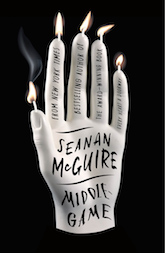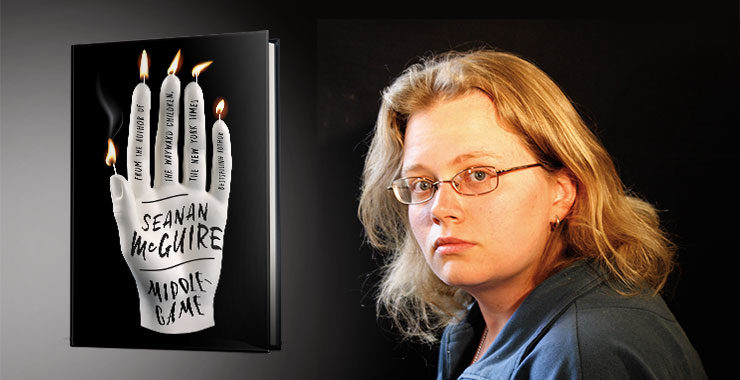So I’ve been asked to write about the process of writing Middlegame, and why I feel like it’s different from other books I’ve written. And to be honest, this request made me a little uncomfortable, because nothing activates my raging case of imposter syndrome like being asked to write about my process, as if I were some big, fancy artist doing big, fancy things, and not me, writing daily, sometimes with frosting on my nose, almost always in my pajamas.
This is my process: I get out of bed, having already assigned myself tasks for the day which include which projects I will be (need to be) working on; these assignments are based on my deadlines, unless I’ve managed to get far enough ahead of deadline to buy myself some free time. When I have free time, it’s less recess, and more free study: I get to work on projects that haven’t necessarily been sold yet, or aren’t slated to be, like the free short stories on my website. The words happen every day that it’s possible, and some days when it really shouldn’t be (Disney World or San Diego Comic Con are both environments that are very antithetical to getting actual work done).
The number of words varies day by day, although the minimum is a part of the “assignment,” which is determined largely by looking at the time between here and the deadline and then dividing using my sustainable minimums. I will usually work on two projects a day, one novel or novella-length, one short fiction or comic script-length. This means things are constantly in a varying state of completion.
On the rare occasions when I run up against a wall (the fabled “writer’s block”), I’ve found that I can usually break it by reminding myself that my deadlines know where I live. My deadlines, in fact, pay my electric bill. When this doesn’t work, I go play a couple of rounds of Overwatch and then get right back to it. My head will usually work out the problem without any conscious intervention if I leave it alone long enough to get down to business. The only times I’ve really had to deal with a work stoppage due to inability to proceed are when I’ve been sick, or when I loathed the people I was working with so much that the thought of progress and thus being forced to deal with them again was worse than the stress of slipping behind. I don’t work with those people anymore.
I know not everyone’s brain works like mine. I know my brain doesn’t work like everyone else’s. Those statements aren’t actually the mirror images they appear to be, since so often, we’re capable of being generous and kind to the people around us, while being cruel and unforgiving to ourselves, all because we’ve decided that our brains are doing something “wrong.” I’m a workaholic who gets most of my dopamine from watching the word counter for a file go steadily upward. It’s cool if you’re not.
When I hit my minimum for the day, I may keep going, or I may stop. A surprising amount of the time, I stop. This gives my brain the room it needs to figure out what’s going to happen tomorrow. If I’m really in the flow, I’ll have finished early enough that I’d feel like a slacker if I stopped. On those days, I’ll keep going until it stops being easy. The “rule of fun” kicks in once I’ve done the word count equivalent of eating my vegetables.
After I finally stop writing words for the day, I’ll deal with email, Tumblr Asks, and website updates (the latter not nearly as often as I honestly should—my website is a nightmare hellscape, neglected and unloved most of the time. And that’s not great! I should spend less time writing and more time doing admin work). And then I eat dinner, do whatever social stuff is on the docket, and go to bed.
I am not a thrilling person.
Buy the Book


Middlegame
How do those deadlines happen? I suppose that’s part of the process, too.
When I have an idea that I think could sustain a book, I’ll take it to my agent. She listens to my fumbling attempt to explain, sometimes patiently, sometimes with exasperation, and either tells me it’s not a book yet, or that I need to go write a pitch. I add “Write Pitch” to my to-do list. A pitch is between one and eight pages, usually, for me. This is my least favorite part of the writing process, since it forces me to map things out in more detail than I enjoy, and can flatten some of my favorite parts of the story until they feel (to me, in the moment) completely lifeless.
With Middlegame, the pitch was four pages long, double-spaced, slightly more than 500 words. To give you a sense of scale, this article is already 800 words long. My agent, who is a smart, generally sensible person accustomed to working with me, said that it didn’t make any sense. I was in one of my “free study” periods, thanks to my tendency to work ahead of goal whenever possible, so I decided that the best way to expand the pitch was by writing the entire book. It’s 150,000 words long, roughly. I completed the first draft in six weeks. That’s fast, even for me.
Now, that doesn’t mean the book was ready for publication when I wrote the last scene. First drafts exist to be terrible, and since Middlegame had no associated deadline (and hence no associated power to pay my rent), it couldn’t take priority over anything else once the free study period ended. It needed edits and rewrites, and those needed to fit around everything else that was already on my plate. It got stolen time for about a year before it was ready to be presented to my agent.
…who promptly requested more revisions before she’d be willing to go out on submission. So more revisions were done, since I need my agent to send things out on submission if they’re going to sell. And eventually, she was satisfied, and then her part of the job kicked in, where she does agent-y things until someone says they’ll give us money, and me professional editing services, and a book is born.
So I don’t think of myself as having a process, really, or of any book as having a different process than any other, since every book is sit down, write, keep writing, edit, edit again, try to sell, hopefully succeed, buy some groceries, nap.
Inspiration is less essential to the process, such as it is, than napping. I love napping.
New York Times bestselling author Seanan McGuire is the author of the October Daye urban fantasy series, the InCryptid series, and several other works, both standalone and in trilogies. She lives in a creaky old farmhouse in Northern California, and was the winner of the 2010 John W. Campbell Award for Best New Writer. In 2013 she became the first person ever to appear fives times on the same Hugo ballot. Her latest standalone novel, Middlegame, is available from Tor.com Publishing.










